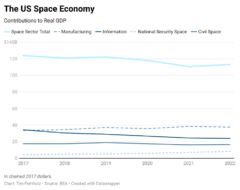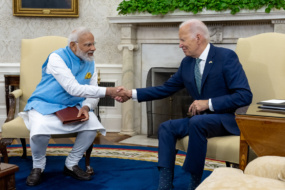Government officials and industry gathered just outside DC last week at the CONFERS Global Satellite Servicing Forum to brainstorm solutions for challenges facing the satellite servicing industry. CONFERS = the Consortium for Execution of Rendezvous and Servicing Operations, an industry group with 60+ members that started in 2017.
Here’s a dispatch from the two-day conference with our top takeaways.
The Goldilocks Effect
Officials were clear that the industry needs some standards, but cautioned that too much red tape could hamstring the nascent market. This search for the “just right” amount of rules is starting to play out at the National Space Council, where officials will host two listening sessions next month on mission authorization and novel space capabilities like servicing and on-orbit manufacturing.
The council will use those listening sessions to draft a proposal for Vice President Kamala Harris no later than March 7, said Diane Howard, the council’s head of commercial space. No word on specifics, but Howard said “I think it will be probably more formal than recommendations.”
Across the pond
France has also begun updating five-year-old space regulations, said Florent Lacomba of CNES, who noted the country currently has no rules governing in-orbit servicing. French officials will propose 30 new requirements—more than the total number of rules on the books today—and aim to finish the process by the end of next year.
Snaps for the FCC
Jacob Geer, chief of staff at the UK Space Agency, applauded the FCC’s recent 5-year deorbiting rule. Geer said the US action has provided cover for British companies to take a similar approach. “For a country the size of the UK to…make that change…it’s almost too strong, it’s almost too dangerous,” he said. “But once a big economy like the US does something like that, it takes some of the fear and risk out of it.”
The need for transparency
If companies start servicing satellites in orbit without being very clear about what they’re doing, things could go south quickly. Therefore, transparency was a key theme of the conference. “If we aren’t transparent, people will assume the worst,” said Mike Gold, Redwire’s EVP for civil space. “Conversely, I’ll tell you a group that isn’t a fan of transparency and that’s China.”
Who’s buying?
Orbital robo-servicers will count civil, commercial, and military space players as customers. Col. Meredith Beg, the deputy director of operations for servicing and maneuver at the Space Force, said that in-space servicing capabilities will be integral for the Pentagon, in part because it would allow troops to maneuver assets to restore capabilities after an attack without worrying about burning through onboard fuel. To that end, the USSF is:
- Establishing a new space mobility logistics program executive officer position within the DoD
- Launching one or more programs to develop and field space mobility logistics tech.
What’s next?
DARPA, which seeded CONFERS, is setting the industry group free at the end of the year. As of Jan. 1, the group will operate outside the US government as a 501(c)(6) organization with a board of directors. Other staffic specifics are are still being finalized, said Astroscale’s COO Chris Blackerby, who serves on the CONFERS executive committee.




